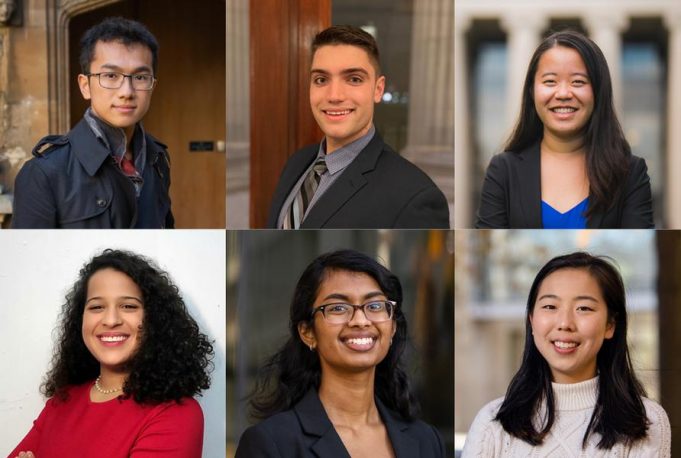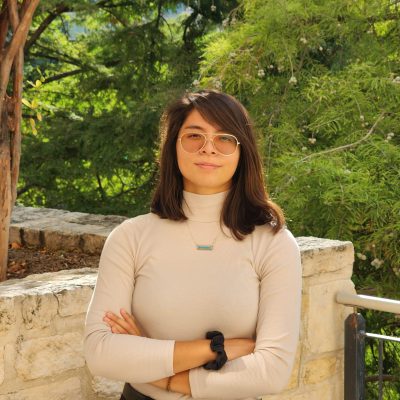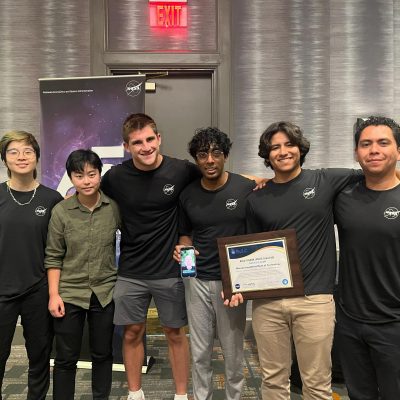
Six MIT Students named 2023 Schwarzman Scholars
Course 16 Senior Bill Kuhl among the six MIT students who will pursue graduate studies in global affairs at Tsinghua University in Beijing
Five MIT seniors — Sihao Huang, William Kuhl, Giramnah Peña-Alcántara, Sreya Vangara, and Kelly Wu — and graduate student Tingyu Li have been awarded 2022-23 Schwarzman Scholarships. They will head to Tsinghua University in Beijing next August to pursue a one-year master’s degree in global affairs. The students will also receive leadership training, career development, and opportunities to gain a greater understanding of China’s role in the world.
The Schwarzman Scholars program aims to build a network of young leaders and encourage them to explore and understand the economic, political, and cultural factors that have contributed to China’s increasing importance as a global power. Scholars are selected on the basis of leadership potential, intellect, and strength of character. This year, 151 Schwarzman Scholars were selected from 33 countries and nearly 3,000 applicants. Since the program’s inception in 2015, 29 MIT students and alumni have been named Schwarzman Scholars.
MIT’s Schwarzman Scholar applicants received guidance from the distinguished fellowships team in Career Advising and Professional Development, with additional mentorship from the Presidential Committee on Distinguished Fellowships. Kim Benard, assistant dean of distinguished fellowships, says, “These students represent the new types of leaders we need to solve our world’s problems: They combine technical expertise with active service and advocacy. The Presidential Committee for Distinguished Fellowships and I could not be more proud to send this impressive contingent of scholars to China.”
Sihao Huang, from New York City, started a spacecraft systems company, Aphelion Orbitals, before arriving at MIT. He is studying physics and electrical engineering with a minor in political science. After working on the design of superconducting quantum processors, he shifted his focus to applying concepts from statistical physics to understand polarization and representation in electoral systems. Huang co-founded the MIT Political Review, the school’s first undergraduate political journal, and currently performs research on Chinese foreign policy. He hopes to further understanding of political and social phenomena using insights from complex systems science. Huang grew up in China and Singapore before moving to the United States.
William (Bill) Kuhl hails from Elmhurst, Illinois, and will graduate from MIT with a BS in aerospace engineering. Passionate about emerging technologies in space, Kuhl co-authored a paper on the design of probes to explore icy moons, and has conducted research in machine learning and signal processing. He interned with Northrop Grumman, captained the Mock Trial team, mentors in makerspaces, plays hockey and played varsity football, and biked across America teaching STEM to underserved children. He is in his second year of the Gordon-MIT Engineering Leadership Program. Kuhl hopes to use his time at Tsinghua to build mutual understanding and relationships to improve Sino-American relations in space.
Tingyu Li
graduated from MIT in 2021 with a BS in computer science and management, and will receive a master of engineering degree in electrical engineering and computer science next May. She is passionate about leveraging the intersections of technology, data, and infrastructure to promote more equitable cities. Li, who is from Shijiazhuang, China, has previously worked at Tencent, Macquarie Capital, and Boston Consulting Group.
Giramnah Peña-Alcántara grew up in New York City and is majoring in biological engineering. She aspires to find cures for people contending with neurodegenerative diseases to help them live long, fulfilling lives with their loved ones. She has performed research at the Horvitz Laboratory at MIT, the Ting Laboratory at Tsinghua University, and the Biomaterials and Interface Tissue Engineering Laboratory at Columbia University. Peña-Alcántara is a passionate advocate for her community and for increasing diversity in STEM. She has volunteered with U.S. Representative Adriano Espaillat, New York City Council Member Ydanis Rodrigues, BoSTEM, the MIT Leadership Training Institute, and MISTI Global Teaching Labs.
Sreya Vangara from Germantown, Maryland, will graduate in May with double majors in mechanical engineering and electrical engineering and computer science. She has conducted research to elevate underprivileged communities through global clean water collaborations in Madagascar and with the Navajo Nation, and has worked on low-cost nuclear reactor designs with Princeton University. Vangara supports sustainable innovation through grassroots educational initiatives, and has taught STEM in Kazakhstan, Mexico, and Hong Kong through MIT Global Teaching Labs. Vangara advocates for collegiate disability rights as co-director of the national nonprofit Synapse, and spearheads accessibility policy on MIT’s campus.
Kelly Wu comes from Madison, Wisconsin, and is majoring in chemical engineering. She cares deeply about the climate crisis and hopes to convene stakeholders and align goals to enable energy system transitions. Wu is president of the MIT Energy and Climate Club, for which she has organized large-scale events, including an international 250-student hackathon. She also helped draft the university’s Climate Action Plan as a student sustainability leader. Her research and professional experiences include mapping the chemical industry and working for a Spanish renewables developer, major oil company, and energy investment firm.

